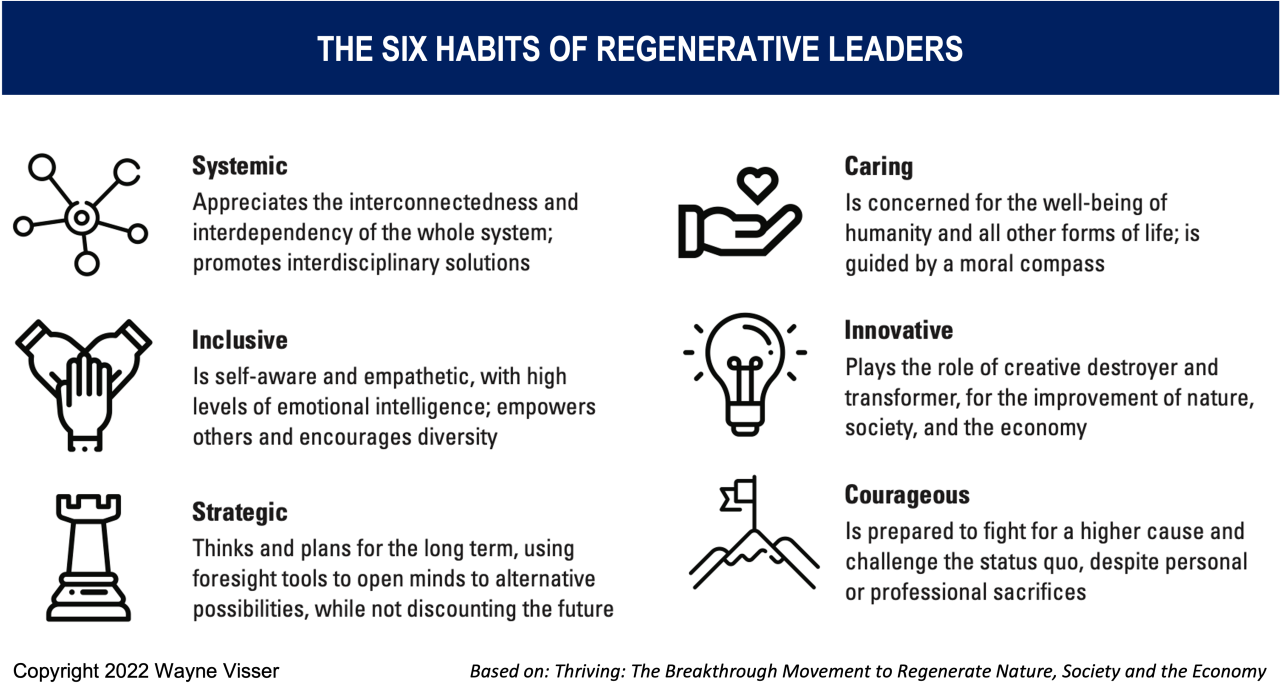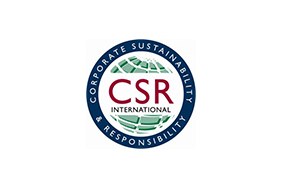The Six Habits of Regenerative Leaders
Thriving Series - Part 7, by Wayne Visser
Published 07-20-22
Submitted by CSR International

What do we mean by leadership? The etymological Anglo-Saxon root of the words lead, leader, and leadership is laed, which means path or road. The verb means to travel. Thus, a leader is someone who takes us on a journey, who shows us the way, who inspires and supports us as fellow travelers to reach a common goal, who challenges and stretches us to pursue a destination in the distance. Today, we face numerous potential breakdowns in our global system (see my article: The Six Great Transitions to Regenerate Nature, Society and the Economy)[i], which calls for a new kind of leader, which I call regenerative leadership.
Is regenerative leadership any different? Do we need leaders with different characteristics, for example? In the research I have done at Cambridge University and at Antwerp Management School, we have put this question to the test, and the short answer is yes—and no. We reached the conclusion that regenerative leadership (or whatever label you prefer to use) is not a separate school of leadership but rather a particular blend of leadership characteristics applied within a definitive context. For the sake of elegance and readability, I have distilled these into six regenerative leadership characteristics, which I explore in more detail in my book, Thriving[ii].
Systemic leadership
Being a systemic and holistic thinker encompasses the ability to appreciate the interconnectedness and interdependency of the whole system, at all levels, and to recognize how changes to parts of the system affect the whole. Regenerative leaders must have skills that support systemic thinking. They must be able to manage complexity. This means analyzing, synthesizing, and translating complex issues; responding to risk, uncertainty, and dilemmas; recognizing and seizing opportunities; and resolving problems or conflicts. Elon Musk, albeit that he is controversial, brings a systemic perspective to changing industries and solving big societal problems.
Inclusive leadership
Regenerative leaders are inclusive leaders. This requires that they are self-aware and empathetic, with high levels of emotional intelligence. Equally important are sincerity, personal humility, and reflexiveness, which requires a leader to be able to see their own place in and influence on a situation. Being inclusive means that collaboration and participation are the default mode of leadership, including building commitment through dialogue and consensus. These leaders embrace democratic approaches, coaching, and nurturing a culture and structure that ensures peer support, provides encouragement, and recognizes achievement. I think of Bunker Roy, the founder of Barefoot College, and Hamdi Ulukaya, CEO of Chobani.
Strategic leadership
Regenerative leaders need to think long term. This entails having a strategic perspective and using foresight tools to help others to see the whole while not discounting the future. McKinsey research shows that long-term-oriented companies deliver 47 percent higher revenues, 36 percent better returns, and generate on average $7 billion more in market capitalization.[iii] But with the short-term orientation of financial markets and shareholder speculators, focusing on long-term value is easier said than done. And yet that is what defines strategic leadership. Former Unilever CEO Paul Polman is an exemplar.
Caring leadership
A regenerative leader is caring and morally driven. They care for the well-being of humanity and all other forms of life, as well as being guided by a moral compass. They are altruistic leaders who focus on transcending self-interest and promoting the collective or the good of the whole; they are servant leaders. Of course, we only care for others when we feel empathy. But empathy is not automatic; it is a learned behavior, cultivated from a young age. We must step out of our selfish bubbles, leave aside our own needs. Empathy is proactive; it means connecting with others emotionally or mentally walking in their shoes. Vandana Shiva and Muhammad Yunus are two caring leaders I have met.
Innovative leadership
Realizing a regenerative future will almost certainly be impossible without breakthrough innovation, and therefore we need innovative leadership. Leaders with a creative style enjoy playing the role of designer, architect, innovator, game changer, and transformer of systems. Leaders like Anita Roddick (founder of The Body Shop) and Yvon Chouinard (founder of Patagonia) are associated with this style, with their highly visible leadership, which included taking risks; acting like a revolutionary, campaigner, crusader, or activist; and challenging the status quo. Sometimes we call this missionary leadership.
Courageous leadership
Regenerative leaders also require moral courage. They need to be convinced that they are fighting for a higher cause and be prepared to challenge the status quo, or even make personal and professional sacrifices to pursue their purpose. For some, this conviction comes late, like Interface founder Ray Anderson’s “spear-in-the-chest” moment when he realized that someday CEOs like him would be put in jail for theft of our children’s future. And for some, like Greta Thunberg, moral courage comes early.
To be a leader in the regeneration revolution, you also need to regenerate yourself. Partly this is about, as Mahatma Gandhi put it, “being the change you want to see in the world.” But more than that, personal regeneration is about looking after yourself, ensuring that you have the perspective and passion, the inspiration and vision, the energy and support, the imagination and focus that you need to continue the work of changing the world for the better. This is a quest of existential magnitude; for many of us, it consumes our careers, our relationships, our life. So we need to make sure that we too are in balance, healthy, and hearty.
--
Dr Wayne Visser is a globally recognized Cambridge pracademic, poet, possibilitist and author of 41 books, including Thriving: The Breakthrough Movement to Regenerate Nature, Society, and the Economy (Fast Company Press, 2022). To find out more about his work and writing, visit www.waynevisser.com
[i] Visser, W. The Six Great Transitions to Regenerate Nature, Society and the Economy, 3BL Media, May 23, 2022.
[ii] Visser, W. Thriving: The Breakthrough Movement to Regenerate Nature, Society and the Economy. New York: Fast Company Press, 2022.
[iii] McKinsey Global Institute, “Measuring the Economic Impact of Short-Termism,” Discussion paper, February 2017.

CSR International
CSR International
CSR International was founded in 2009 with the mission to be an incubator for CSR 2.0, which means Transformative Corporate Sustainability & Responsibility (CSR). Since then, we have delivered CSR training around the world, welcomed many people through our internship program, shared hundreds of CSR Research Digests and licensed CSR 2.0 Assessors & Advisors.
More from CSR International

